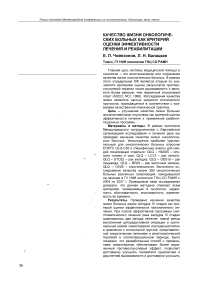Качество жизни онкологических больных как критерий оценки эффективности лечения и реабилитации
Автор: Чойнзонов Е.Л., Балацкая Л.Н.
Журнал: Сибирский вестник психиатрии и наркологии @svpin
Рубрика: Тезисы докладов международной конференции по психоонкологии "Культура, мозг, тело"
Статья в выпуске: 3 (50), 2008 года.
Бесплатный доступ
Короткий адрес: https://sciup.org/14295265
IDR: 14295265
Текст статьи Качество жизни онкологических больных как критерий оценки эффективности лечения и реабилитации
Проведена оценка количественных и качественных характеристик качества жизни больных опухолями головы и шеи как критерий оценки применения реабилитационных мероприятий после комбинированного лечения. При достижении высокого онкологического результата хирургическое вмешательство при опухолях указанной локализации приводит к нарушению таких жизненно важных функций, как речь, голос, дыхание, жевание и глотание. Разработана программа голосовой реабилитации больных после полного удаления гортани с использованием новых компьютерных технологий на основе математического моделирования. Применение данной методики позволяет восстановить голосообразующую функцию в 92,8 % случаев и возвратить к трудовой деятельности 67 % пациентов трудоспособного возраста.
Исследование качества жизни в сравнительном аспекте показало, что проведение реабилитационных мероприятий по разработанной методике позволяют улучшить физическое, психологическое и социальное функционирование пациента, уменьшить проблемы с речью, снизить показатели утомляемости и бессонницы, увеличить общий статус здоровья с 41,4 балла до 80 баллов.
Таким образом, изменения параметров качества жизни особенно проявляются у онкологических больных и во многом определяются этапом развития опухолевого процесса, эффективностью лечения и реабилитации. На ранних стадиях заболевания физическое состояние пациента, как правило, не нарушено, однако имеет место изменение психологического и социального функционирования. На поздних стадиях пациент переживает критические изменения во всех сферах жизнедеятельности – физической, психологической, социальной. Применение новых высокотехнологичных методов лечения и разработки реабилитационных программ позволяет значительно улучшить качество жизни онкологических больных.
QUALITY OF LIFE OF CANCER PATIENTS AS A CRITERION OF ASSESSMENT OF EFFICACY OF TREATMENT AND REHABILITATION
E. L. Choinzonov, L. N. Balatskaya
Tomsk, Cancer Research Institute Tomsk Scientific Center SB RAMSci
The main aim of system of medical assistance in cancer research is restoration or maintenance of quality of life of cancer patients. Within this definition QL is the second in significance criterion of assessment of results of anti-tumor therapy after survival and is more important than primary tumor response (ASCO, NCI, 1990). Investigations of quality of life are a part of broad clinical proceedings conducted according to rules of qualitative clinical practice.
Objective of investigation is improvement of quality of life of patients with malignant tumors as a criterion of rating of the efficacy of treatment and application of rehabilitative programs.
Materials and methods . Within proceedings of International Collaboration with European organization of research and treatment of cancer we conduct study of quality of life of cancer patients. We use the most sensitive for cancer patients questionnaire EORTC QLQ-C30 and specific questionnaires for every localization separately: QLQ – H&N35 – tumors of head and neck; QLQ – LC13 – cancer of lung; QLQ – STO22 – cancer of stomach; QLQ – OES18 – cancer of gulletа; QLQ – BR23 – breast cancer; QLQ – OV28 – cancer gynecology. We have accomplished investigation of quality of life of 380 cancer patients with various localizations under treatment at SI Cancer Research Institute TSC SB RAMSci from 2004 till 2007 years. Conducted by us investigations have proven that this methodology meets all criteria applied in cancer research: reliability, validity, multidimensionality, changeability in time.
Results. We have conducted study of quality of life of patients with stomach cancer of stage IV, as a criterion of rating of efficacy of palliative treatment. During search for effective program of symptomatic treatment of stomach cancer of stage IV we compared two methods of treatment: new method of performance of cytoreducive operation and original regime of chemotherapy with xeloda/cysplatine as compared with control group represented by surgical treatment and symptomatic therapy in post-operative period. It has been shown that developed way with application of chemotherapy provides more severe anti-tumor effect, allows reliable improvement of indices of one-year and two-year survival and reliable improvement quantitative indices of QL. In addition, in patients against the background of chemotherapy with application of xeloda/cysplatine we observed significant decrease of severity of pain, weakness, improvement of appetite as well as improvement of indices of physical, psychological functioning and general status of health. According to conducted investigation it has been proved that quality of life is a single aim of treatment of patients in incurable stage of disease.
We have conducted assessment of quantitative and qualitative characteristics of quality of life of patients with head and neck tumors as criterion of rating of application of rehabilitative activities after combined treatment. During achievement of high cancer result surgical intervention in tumors of indicated localization results in disturbance of such vitally important functions as speech, voice, breathing, chewing and swallowing. We have developed program of voice rehabilitation of patients after complete removal of larynx with use of new computer technologies based on mathematic modeling. Application of this methods allows restoring the voice-forming function in 92,8 % of cases and return to work activity.
Investigation of quality of life in comparative aspect has shown that conducting of rehabilitative activities according to developed methods allow improving the physical, psychological and social functioning of the patients, diminishing the indices of fatigue, sleeplessness, increasing the total status of health from 41,4 scores up to 80 scores.
Thus, changes of parameters of quality of life manifest themselves in cancer patients and are mostly determined by stage of development of tumor process, efficacy of treatment and rehabilitation. At early stages of disease physical state of the patient as a rule has not been disturbed however there is a change of psychological and social functioning. At late stages patient experiences crucial changes in all spheres of life activity – physical, psychological, social ones. Application of new high-tech methods of treatment and development of rehabilitative programs allow significant improvement of quality of life of cancer patients.


